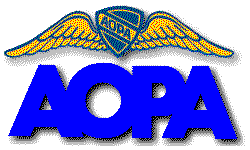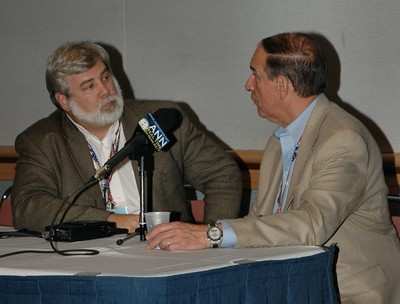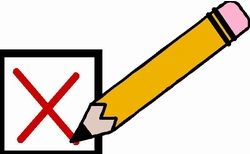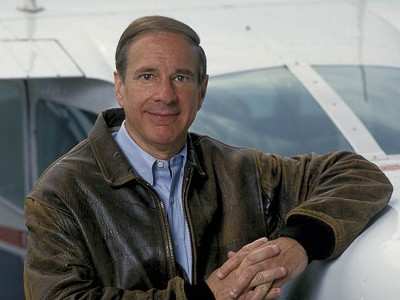Election Day Is November 7! Get Out And Vote!
 Unless you've been
living under the proverbial rock for the past six months, you're
probably aware next Tuesday is Election Day. There are a number of
high-profile, hotly contested races throughout the country that
likely hinge on how the voters feel about such volatile issues as
the war in Iraq.
Unless you've been
living under the proverbial rock for the past six months, you're
probably aware next Tuesday is Election Day. There are a number of
high-profile, hotly contested races throughout the country that
likely hinge on how the voters feel about such volatile issues as
the war in Iraq.
But as pilots, we must also keep in mind how our votes may
influence how we wind up paying for ATC services, as well... and
that's a message Phil Boyer, president of the 408,000-member-strong
Aircraft Owners and Pilots Association, wants everyone to
consider.
"First of all, everyone needs to vote," Boyer told ANN in a
recent interview, noting AOPA members typically turn out in numbers
MUCH stronger than the national average, even in midterm elections
such as this one.
"This is an important election, because of the FAA's and the
airlines' call for looking at new funding methods for the FAA. Our
Congress and our elected officials are very, very critical to
making that decision. The FAA, White House, the airlines... they
can yell and scream all they want to about changing the system, but
the actual change has to be made in legislation that would occur by
the end of their fiscal year, September 30 of '07."

The decision Congress makes regarding FAA funding, Boyer says,
will set forth a pattern of funding that could last five to 10
years.
"It could be a continuation of our aviation taxes, which have
served us well for over three decades," Boyer said. "I'll raise the
ugly "user fee" word... it could be user fees. It could user fees
for airlines, and no one else, or user fees for airlines and
business aviation, if you want to separate general aviation and the
fuel tax for piston planes. Or it could be a higher fuel tax for
all of general aviation. And that debate will occur... but remember
the people you go to the polls to elect will be making this
decision."

Listen To Part One Of Our Interview With AOPA's Phil Boyer Here, and then, Part Two Here
Also critical in this election is the number of key committees
in which the terms limits for committee chairs have run out -- such
as the Aviation Subcommittee, and the entire Transportation and
Infrastructure Committee. The ruling party in each house of
Congress gets to determine who fills those seats.
So, let's get to the real nitty-gritty. Which party would be
"better" for aviation -- Democrats, or Republicans? Boyer, who
works closely with members on both sides of the aisle, gave a
considered response.
 "It's difficult... but
if we talk about how we've fared under Congress, not necessarily
the person in the White House... both a Democratic Congress and a
Republican Congress have called for user fees," Boyer said. "In
general aviation, a more Democratic Congress is generally more
sympathetic to the subsidies -- and I don't think that's a dirty
word -- that exist in all areas of transportation, and other areas
of government.
"It's difficult... but
if we talk about how we've fared under Congress, not necessarily
the person in the White House... both a Democratic Congress and a
Republican Congress have called for user fees," Boyer said. "In
general aviation, a more Democratic Congress is generally more
sympathetic to the subsidies -- and I don't think that's a dirty
word -- that exist in all areas of transportation, and other areas
of government.
"So a more left-leaning -- rather than right-leaning,
high-privatization, high 'business should be everything, government
should do very little' -- we fare a lot better off if we look at
more at the more moderate, or democratic side."
"I think we have to look at the political parties, and both
sides of Congress," Boyer continued. "We know we'll have basically
a lame-duck president for the next two years. With that being said,
we now have both houses of Congress that are up for grabs."
"Probably a good scenario, if you wanted a candid look at all of
this... if you look at the rumors that the House is more than
likely at this point to go Democratic, and kind of a question mark
on the Senate... this is my personal opinion," Boyer
noted, "but we'd end up with pretty good position going into
the debate on FAA funding. Lame duck White House, Democratic house,
Republican senate."
"Would you say a lot will get done, or very little?" Boyer asks
with a barely audible chuckle. "We'd probably fare best with very
little attention getting done to things like (FAA funding)."
And what if both houses of Congress go to one party?
"We'd probably still get a very fair hearing, but once again
there will now be two houses of Congress Democratic," Boyer said.
"If the Republicans sweep all, we'll be working quite a bit harder
here at AOPA and other organizations that would like to not see a
dramatic change in FAA funding, because there would be that mass of
power. But would Republicans put the attention to this issue? Is it
of that magnitude, or will this be overshadowed by much bigger
national and international issues?"

And speaking of those issues -- Boyer (shown above) is very
aware that aviation isn't foremost on the minds of most voters...
or even most politicians. After all, that's what AOPA members pay
their annual dues for... so they have an organization focused on
aviation.
"We sent questionnaires to a number of key people in races,"
Boyer said. "I think we have about 72 responses, 65 from
incumbents, and we asked them three questions: do they support a
federal general fund to support the FAA? Do they support user fees?
And do they support continued Congressional oversight of the FAA,
or do they want that turned over to others?
"Almost universally, they were in support of Congress being in
charge, or the Board of Directors of the FAA. Almost unanimously,
they were in support of the general fund contribution... and then
we got 39 real strong responses opposing user fees, with others
giving us an answer like "I'll need to see more facts," leaving a
kind of hedge there."
"The November issue of our magazine (AOPA Pilot) devoted a
number of pages to individuals running for both the Senate and the
House, on both sides of the aisle," Boyer says. "I always fear this
article, because once again, you don't pay AOPA to worry about
right-to-life, or social security reform, or all the other issues
you should be concerned about when you go to the polls."
"You pay us your dues to think about aviation."
 ANN's Daily Aero-Linx (04.30.25)
ANN's Daily Aero-Linx (04.30.25) ANN FAQ: Turn On Post Notifications
ANN FAQ: Turn On Post Notifications Classic Aero-TV: Agile Aeros Jeff Greason--Disruptive Aerospace Innovations
Classic Aero-TV: Agile Aeros Jeff Greason--Disruptive Aerospace Innovations Aero-News: Quote of the Day (04.30.25)
Aero-News: Quote of the Day (04.30.25) ANN's Daily Aero-Term (04.30.25): Expedite
ANN's Daily Aero-Term (04.30.25): Expedite






